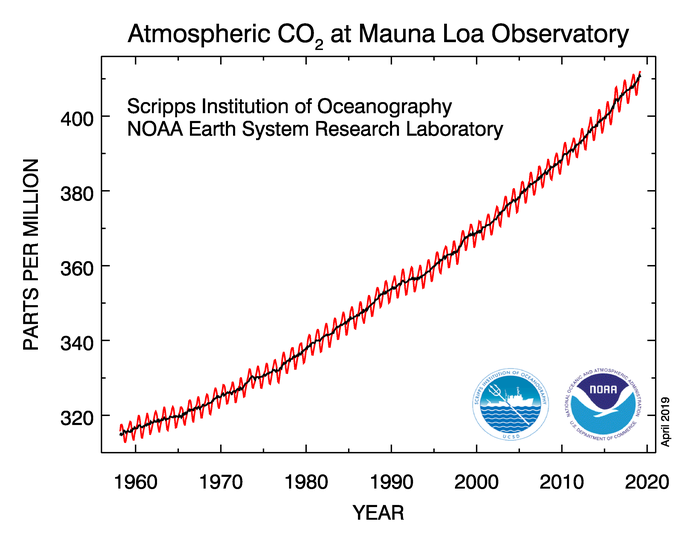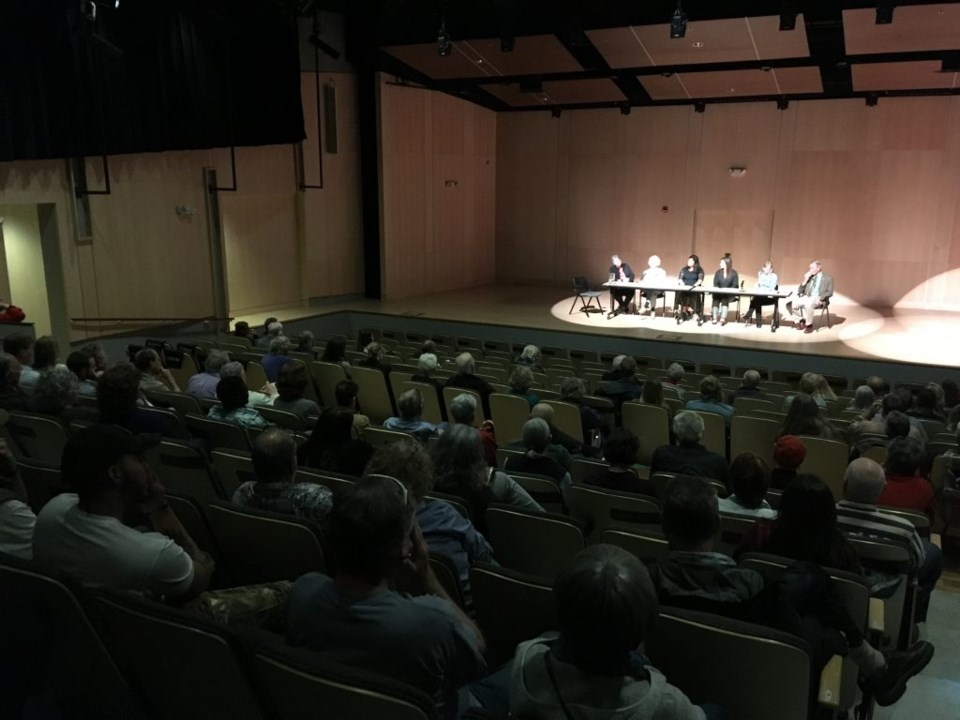This content was originally published by the Longmont Observer and is licensed under a Creative Commons license.
With over 75 people seated in Steward Auditorium at the Longmont Museum on Thursday, April 18, a collection of scientists, activists, and public officials presented and discussed the science of climate change, its possible effects on Longmont, and what the community is doing to minimize its impact.
The Climate Sustainability Roundtable, sponsored by Sustainable Resilient Longmont, was moderated by Liz Lane, producer and news host at KGNU Community Radio. The evening began with a presentation by Dr. James Butler from the Earth System Research Laboratory of the National Oceanic and Atmospheric Administration, who provided startling graphics and statistics regarding concentrations of carbon dioxide (CO2) in the earth’s atmosphere. Similar to the graph below, Dr. Butler emphasized that, “90% of the CO2 that has accumulated in the atmosphere has been emitted since 1900.”

Source: https://www.esrl.noaa.gov/gmd/ccgg/trends/full.html
The increase in carbon naturally leads to an increase in the temperature of the atmosphere. “It is simple physics and if you want to deny physics, try denying gravity,” Dr. Butler quipped. The average global temperature has already increased by 1 to 2 degrees centigrade and, “2/3 of temperature increases has occurred after 1970,” Dr. Butler remarked.
Because it takes time for the planet’s average temperature to change in reaction to CO2 levels, even if we stopped all carbon emission today, Dr. Butler explained there will still be significant global warming, likely leading to widespread crop failure and the need for people to forage for food. The need to forage for food will create large flows of human migration that could lead to conflicts at all levels of society.
The rest of the roundtable guests were then introduced:
- Karen Dike, Sustainable Resilient Longmont
- Joan Peck, Longmont City Council
- Magnolia Landa-Posas, Just Transitions Collaborative, University of Colorado at Boulder
- Emily Gedeon, Colorado Sierra Club
- Elise Jones, Boulder County Commissioner and Air Quality Control Commission
The moderator asked each of the roundtable participants to provide their reaction to Dr. Butler’s presentation and outline for the audience the actions that her organization were conducting to mitigate climate change.
Karen Dike remarked in reaction to Dr. Butler’s presentation, “We should have been working on this 40 years ago,” but also admitted her excitement around changes that have been made in even the last 5 years, including her work with the local power cooperative to move utilities toward the goal of all renewable energy production.
Joan Peck admitted feeling despondent by the presentation, but then emphasized, “I do feel there is hope and that we as a community can address it.” She discussed how sustainability is now central to the Envision Longmont development plan, which includes the establishment of a sustainability plan and hiring of a sustainability coordinator.
Magnolia Landa-Posas reflected that the presentation showed that humans are, “Really good at getting into trouble,” but that it also inspired her to declare, “bring it on.” Magnolia then discussed the mission of her organization, Just Transitions Collaborative, to infuse discussions around sustainability with the issues of economic vitality and social equity and to ensure that underrepresented groups are included in the decision making process on issues of sustainability. “If we are going to transition to a sustainable economy, let’s use this opportunity to also address labor and equity issues,” Magnolia argued.

Emily Gedeon shared the presentation made her, “Spend a minute feeling frustrated that we haven’t done more and also feel inspired to take action because we don’t have much time left.” Emily’s organization, Colorado Sierra Club, is focused on local actions and coordinating with the rest of the Sierra Club chapters for action on the national level. She highlighted programs like Beyond Coal and pushing state leaders to commit Colorado to become 100% renewable.
Elise Jones’s reaction to the presentation was to ponder, “After seeing such a clear-cut, scientific presentation, how can anyone deny climate change?” Elise went on to explain how climate action is one of the top 5 strategic goals for the Board of Boulder County Commissioners, including committing to the goals of the Paris Agreement through the Energy Smart program for county residents and the PACE program for county businesses.
The roundtable then answered questions gathered from the audience. Dr. Butler answered questions about the impact of meat production on climate change, what will be the local effects of climate change, and how can we remove politics from the conversation about climate change.
On the last question, Dr. Butler suggested retorting to anyone who denies the reality of climate change by stating, “Climate change is not a matter of belief,” and then asking, “what are you gonna do about it?”
The other roundtable guests answered questions related to their opinions on the recently passed Senate Bill 19‑181 to reform the Colorado Oil and Gas Conservation Commission, the pillars of sustainability, how plastic affects the oceans, if recycling is still of value now that China will no longer accept recycled materials, and how population growth may affect climate change.


